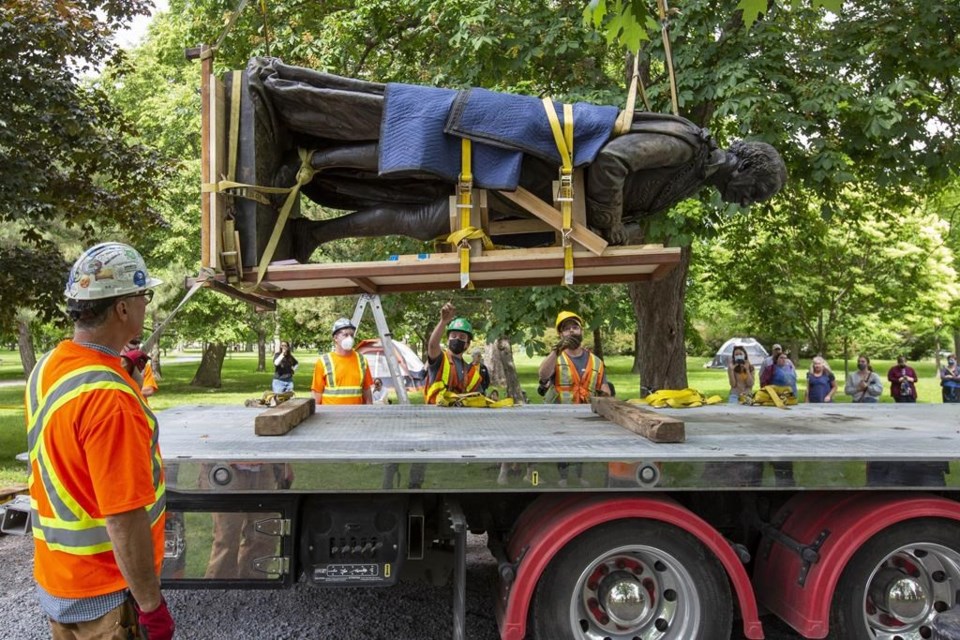A community in southwestern Ontario says it will scrap a project involving statues of past prime ministers in an effort to encourage healing and cohesion.
The Township of Wilmot's councillors voted unanimously on Monday night to discontinue the Prime Ministers Path and remove four remaining statues of former prime ministers from the site in Baden, Ont., near Kitchener, Ont.
A statue of Sir John A. Macdonald was removed from the site last August after the township decided to consult with the public about the project, saying it recognized that unbalanced historical representation perpetuated sentiments of oppression and marginalization for some.
Les Armstrong, the township's mayor, said it wasn't a difficult decision to act on a recommendation from an Indigenous advisory firm to remove the project's statues.
"I love this community and I think it just needs the opportunity to heal and be the community that I know it is with caring and loving people," Armstrong said in an interview Tuesday.
He said, however, that he was disappointed the entire path project will be discontinued.
"I thought the path was an opportunity for teaching and for people to learn the entire history of Canada," he said. "But now that won't take place — it's done, so now we just have to carry on."
The Prime Ministers Path project included statues of Macdonald, Sir Robert Borden, William Lyon Mackenzie King, Lester B. Pearson and Kim Campbell.
Those statues will be put in storage with Macdonald's and the township will decide later what to do with them, the mayor said.
Wilmot said it will create a working group with balanced representation "to discuss, develop and suggest plans for the implementation of next steps centred in community cohesion and healing."
It also said it will work to transform community engagements "in a way that encourages greater openness, accountability and citizen participation in decision making."
The township had tasked First Peoples Group, an Indigenous advisory firm in Ottawa, to lead the community consultation on the project. The firm organized community conversations and a "broad online engagement" for Wilmot residents, the township said.
First People's Group then produced a "what we heard" report, which recommended the statues' removal.
"We want to reiterate that we recognize that this has been a difficult conversation for the community, however the hard work has only just begun," First Peoples Group president Guy Freedman said in a statement.
"We hope that courage and kindness guide your future engagements to move forward on these issues and remind you all that Wilmot has the potential to show Canada that healing and reconciliation can be achieved."
Macdonald, Canada's first prime minister, is considered an architect of the country's notorious residential school system that took Indigenous children from the families in an effort to assimilate them.
Cowessess First Nation last week said that ground-penetrating radar detected 751 unmarked graves at the former Marieval Indian Residential School, not long after the discovery of what are believed to be the remains of 215 children in Kamloops, B.C. and 182 human remains in unmarked graves at a site close to a former residential school in Cranbrook, B.C.
Macdonald's likeness has been removed from various public spheres over the last year.
In mid-June, Kingston city council voted to remove Macdonald's statue from a city park with the goal of putting it up at the cemetery where he is buried.
The city even had to remove the pedestal where Macdonald's statue stood this week due to continued vandalism.
This report by The Canadian Press was first published July 6, 2021.
Liam Casey, The Canadian Press

